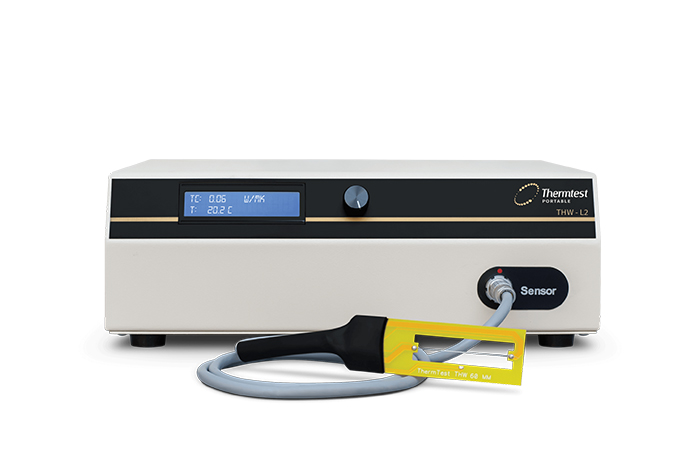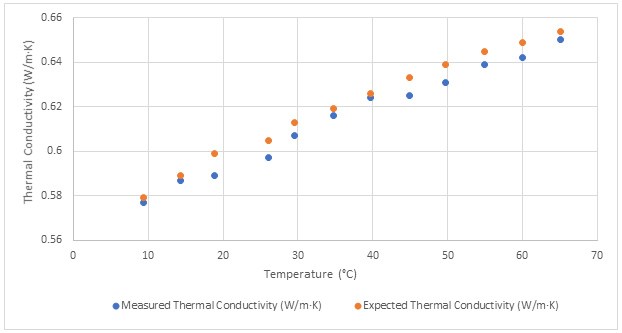Water is a molecule composed of hydrogen and hydroxyl ions, when together forms H2O. Water that comes from a faucet contains ions that are naturally found in soils; such as iron, copper, calcium, and sodium. Using tap water containing impurities during a laboratory experiment could potentially alter a product’s chemical composition. As the name suggests, deionization is the process of removing these charged ions – leaving nothing but the water molecule in its purest state. Deionized ultra-filtered (DIUF) water is a readily available solvent that has well-characterized thermal properties over a range of temperatures.
Using the Thermtest Liquid Thermal Conductivity Meter (THW-L2), the bulk thermal conductivity (W/m·K) of a sample of Deionized Ultra-Filtered (DIUF) Water was measured at various temperatures. This application page will demonstrate the THW-L2’s ability to accurately measure the thermal conductivities of liquids, with temperatures.

Figure 1. The Thermtest THW-L2 Liquid Thermal Conductivity Meter with sample holder for testing the thermal conductivity of liquid and paste samples.
Based on the transient hot wire (THW) technique, Thermtest’s Liquid Thermal Conductivity Meter (THW-L2) is an advanced measurement system for the direct determination of thermal conductivities of liquids and pastes in accordance with ASTM D7896 -14. The THW-L2 measures the thermal conductivity of liquids and pastes from 0.01 to 2 W/m·K, and between temperatures of -50 to +100 °C. Additionally, the THW-L2 uses a transient measurement approach and rapid test times of one second to limit convective effects for samples with a wide range of viscosities. With a thin heating wire that acts as both a sensor and heat source during measurements, this method ensures accurate results within 5%, and excellent reproducibility, typically better than 2%.
In this experiment, researchers at Thermtest set out to measure the thermal conductivity (W/m·K) of DIUF water at temperatures ranging from 0 to 65 ˚C with the THW-L2. When calibrating the THW, the calibration material should be similar in viscosity and thermal properties as the sample being tested. DIUF water is a typical baseline material for calibrations of liquids with the THW instrument. For a calibration measurement, the transient hot wire sensor is inserted into the DIUF calibration material, and the measured thermal conductivity value is adjusted to match the expected thermal conductivity value at the stated temperature.
For thermal conductivity measurements, researchers transferred the DIUF water sample into the THW-L2 sample holder and inserted the THW sensor into the cell. Once isothermal conditions were met, tests were performed on the liquid at 12 different temperatures between the range of 0-65℃. The resulting thermal conductivity measurements were auto-calculated by using the THW-L2 software.

Figure 2. The comparison of measured and expected Thermal Conductivity (W/m•K) values of DIUF water, measured with the THW-L2 Liquid Thermal Conductivity Meter, at 0-65℃ in Thermtest Laboratories.
As the manufacturer of the THW-L2 suggests, users can expect an accuracy of ±5% and reproducibility of ±2%. As can be seen in Figure 4, the thermal conductivity readings of the measured DIUF water sample from 0˚C to 65˚C were all within 2% of the actual DIUF values.
The THW-L2 Transient Hot Wire Liquid Thermal Conductivity Meter is an advanced measurement system for direct determination of the thermal conductivity of liquids and pastes in accordance with ASTM D7896-14. Portable, economical, accurate, and easy to use. Get your results without the effects of convection.
References: